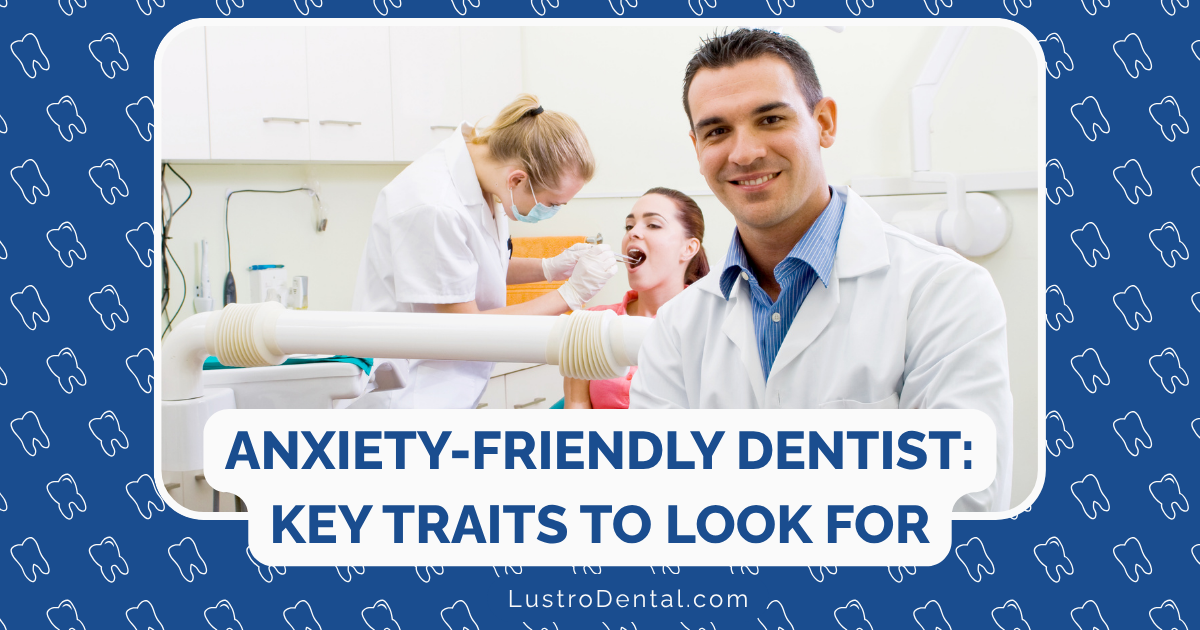Choosing an Anxiety-Friendly Dentist: What to Look For

The thought of sitting in a dental chair leaves millions of Americans feeling anywhere from mildly uncomfortable to completely terrified. In fact, according to recent statistics, approximately 36% of the population experiences dental anxiety, with about 12% suffering from extreme dental fear that prevents them from seeking necessary care.
If dental anxiety has kept you from maintaining your oral health, you’re not alone—and finding the right dentist can make all the difference. An anxiety-friendly dentist doesn’t just treat teeth; they understand the emotional aspects of dental care and create an environment where fearful patients can feel safe and supported.
But how do you find a dental professional who truly understands dental anxiety? Let’s explore the key qualities to look for and practical steps to take when searching for a dentist who can help you overcome your fears.
Understanding What Makes a Dentist “Anxiety-Friendly”
Not all dentists are equally equipped to handle patients with dental anxiety or phobia. Truly anxiety-friendly dentists share several important characteristics:
1. Specialized Training and Approach
Look for dentists who:
- Have additional training in anxiety management or behavioral dentistry
- Explicitly mention treating anxious patients in their marketing materials
- Belong to organizations focused on patient comfort and anxiety management
- Use trauma-informed approaches to dental care
According to Capitol Dental, trauma-informed care is essential in fear-free dentistry, focusing on understanding and accommodating patients’ emotional and psychological histories rather than simply treating physical symptoms.
2. Exceptional Communication Skills
Anxiety-friendly dentists typically:
- Take time to listen to your concerns without rushing
- Explain procedures in detail using non-threatening language
- Avoid judgment or dismissive responses to your fears
- Check in regularly during procedures
- Provide clear answers to your questions
3. Patient Control Emphasis
The best dentists for anxious patients prioritize your sense of control by:
- Establishing stop signals you can use during treatment
- Respecting your boundaries and limits
- Proceeding at a pace you’re comfortable with
- Involving you in treatment decisions
- Never making you feel pressured or rushed
4. Comprehensive Anxiety Management Options
Look for practices that offer multiple approaches to anxiety management:
- Various sedation options (nitrous oxide, oral sedation, IV sedation)
- Non-pharmacological techniques (guided relaxation, distraction methods)
- Comfort amenities (headphones, weighted blankets, aromatherapy)
- Flexible scheduling to accommodate anxiety (longer appointments, morning slots)
How to Research Potential Dentists
Finding the right dentist takes some detective work. Here are effective strategies for identifying anxiety-friendly dental professionals:
1. Online Research Strategies
Start by:
- Searching specifically for terms like “anxiety-friendly dentist,” “dental phobia specialist,” or “sedation dentistry” in your area
- Reading the “About Us” and services pages on dental practice websites for mentions of anxiety management
- Looking for pages dedicated to dental anxiety on their website (a good sign they take it seriously)
- Checking if they offer free meet-and-greet consultations
2. Review Patient Testimonials Carefully
Online reviews can provide valuable insights:
- Look specifically for mentions of how the dentist handles nervous patients
- Pay attention to comments about the office environment and staff attitudes
- Note mentions of the dentist’s communication style and willingness to listen
- Watch for reviews from patients who specifically mention overcoming dental anxiety
Ryba Dentistry suggests checking online reviews and testimonials specifically for mentions of compassionate care and understanding of dental anxiety, as these firsthand accounts often reveal how a practice truly handles anxious patients.
3. Seek Personal Recommendations
Some of the best referrals come from:
- Friends or family members who also experience dental anxiety
- Mental health professionals who may know dentists skilled with anxious patients
- Local dental anxiety support groups (online or in-person)
- Your primary care physician
4. Evaluate Their Credentials and Experience
Consider:
- How long they’ve been practicing
- Whether they have specialized training in anxiety management
- If they regularly attend continuing education on patient comfort
- Membership in professional organizations focused on patient experience
Questions to Ask Before Booking an Appointment
Once you’ve identified potential dentists, reach out with these important questions:
For the Front Office Staff:
- “Do you have experience working with patients with dental anxiety?”
- “Does the dentist offer a consultation visit before treatment?”
- “What anxiety management options does your office provide?”
- “How does the dentist typically handle nervous patients?”
- “Can I bring someone with me to my appointments?”
During a Consultation with the Dentist:
- “What is your approach to helping anxious patients feel comfortable?”
- “Can we establish a signal for when I need a break during treatment?”
- “How do you ensure patients don’t feel pain during procedures?”
- “What sedation options might be appropriate for my level of anxiety?”
- “Can we start with a simple procedure to build trust before more complex work?”
According to The Fort Union Dentist, a pre-treatment consultation is invaluable for anxious patients, as it allows you to express your concerns and work with the dentist to create a personalized approach to your care.
Evaluating the Office Environment
The physical space and atmosphere of a dental practice can significantly impact your anxiety levels. During your initial visit, notice:
1. Reception Area
- Is it welcoming and calming or clinical and sterile?
- Are there comfortable seating options?
- Is there pleasant music or other distractions available?
- Does it feel crowded or spacious?
2. Staff Interactions
- How do staff members greet and interact with patients?
- Do they seem rushed or do they take time with each person?
- Is privacy respected during check-in discussions?
- Do they appear patient and understanding?
3. Treatment Rooms
- Are there distractions available (ceiling TVs, music options)?
- Is the equipment visible or tastefully concealed when not in use?
- Are comfort items like blankets or pillows offered?
- Does the space feel private and secure?
Strategic Dental Care emphasizes that a welcoming physical environment with comfortable seating and a soothing ambiance can significantly reduce anxiety before treatment even begins.
Red Flags to Watch For
Be cautious if you notice:
- Staff who seem dismissive of your anxiety concerns
- Unwillingness to take time to answer your questions
- Pressure to proceed with treatment before you’re ready
- Limited or no options for anxiety management
- Rushed appointments with minimal explanation
- An office environment that feels chaotic or stressful
Preparing for Your First Appointment
Once you’ve found a promising dentist, set yourself up for success:
1. Schedule Strategically
- Book an appointment time when you won’t feel rushed (first appointment of the day or after lunch)
- Allow extra time so you don’t feel stressed about being late
- Consider a shorter initial visit to build confidence
2. Communicate Clearly
- Be honest about your anxiety level and specific triggers
- Share any negative past experiences that contribute to your fear
- Discuss what has helped (or not helped) in previous dental situations
3. Bring Support
- Ask if you can bring a trusted friend or family member
- Consider bringing comfort items (stress ball, personal music)
- Have relaxation techniques ready to use (deep breathing, visualization)
4. Set Realistic Expectations
- Understand that overcoming dental anxiety is a process
- Celebrate small victories (like completing an examination)
- Know that a good dentist will respect your pace
Building a Long-term Relationship
Finding an anxiety-friendly dentist is just the beginning. Building trust takes time:
- Start with simpler procedures before progressing to more complex treatments
- Provide feedback after each visit about what helped and what could be improved
- Maintain regular appointments to build familiarity and comfort
- Remember that each positive experience helps rewire your brain’s association with dental care
The Payoff: Better Oral and Overall Health
Taking the time to find the right anxiety-friendly dentist can transform your relationship with dental care. As Dossett Dental points out, addressing small oral problems early helps avoid extensive dental work later—a particularly important benefit for those with dental anxiety.
With the right dental partner, you can:
- Receive regular preventive care that prevents more invasive procedures
- Address small issues before they become major problems
- Improve your overall health (as oral health is connected to many systemic conditions)
- Gradually reduce your anxiety through positive experiences
- Feel empowered rather than helpless about your dental health
Final Thoughts: Your Comfort Matters
Remember that dental anxiety is a real and valid concern—not something to be embarrassed about or ignored. A truly good dentist will never make you feel ashamed of your fears but will instead work with you to overcome them gradually.
You deserve dental care that respects both your physical and emotional needs. With patience and persistence, you can find a dental professional who will help you maintain your oral health while honoring your comfort level every step of the way.
Have you found an anxiety-friendly dentist who made a difference in your dental experience? Share your tips for finding compassionate dental care in the comments below.







